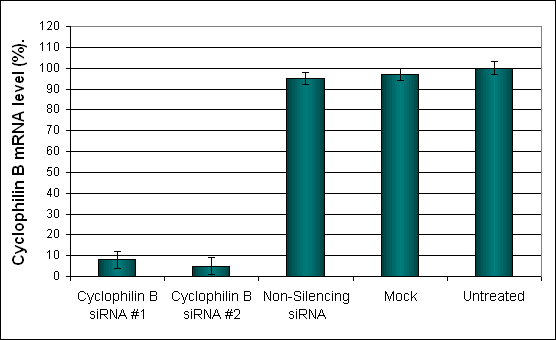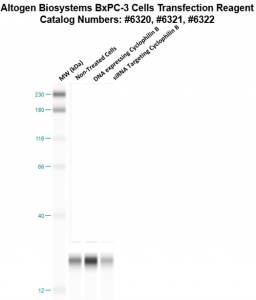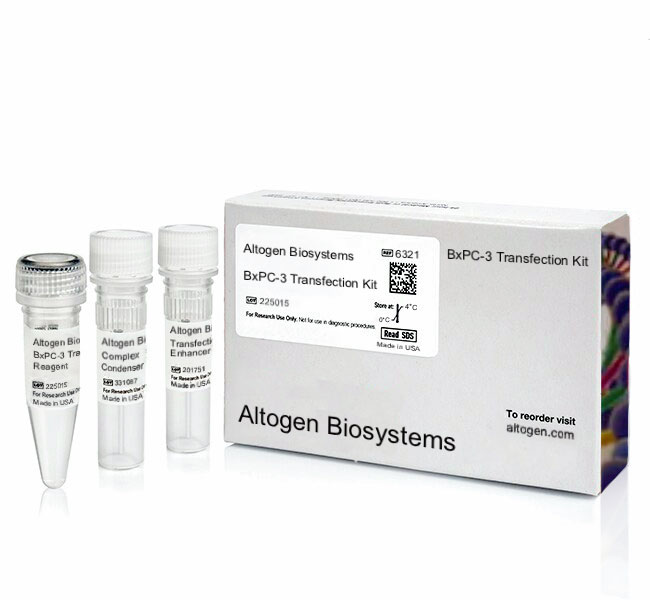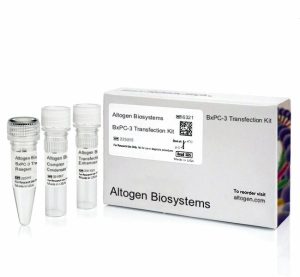Description
Purchase Orders: Click “Add to Cart” button to order, then email PO to orders@altogen.com.
Product Availability: In Stock.
Transfection Reagent for BxPC-3 Cells (Pancreatic Cancer Cells, CRL-1687)
- Proprietary cationic lipids formulation
-
High transfection efficiency of small RNA (siRNA, shRNA, miRNA), mRNA, pDNA
-
Effective and robust intracellular delivery
-
Kit includes Transfection Enhancer reagent
-
Produces consistent results, lot-to-lot, plate-to-plate, and well-to-well
-
Work in the presence of serum
-
A proven reagent for establishing stable cell lines
-
Optimized transfection protocols are adapted for use with both standard & reverse transfection methods
-
Download in vitro BxPC3 transfection protocol: [PDF]
- Download BxPC-3 CRISPR/Cas9 transfection protocol: [PDF]
- Download PowerPoint presentation for BxPC3 cells transfection kit: [PPT]
- UPC/GTIN/EAN: 860002089732
-
Brand: ALTOGEN®, developed and manufactured by Altogen Biosystems
Transfection Efficiency:
Reagent exhibits at least 92% transfection efficiency of siRNA delivery. Transfection efficiency was determined by qRT-PCR.
Product Description:
Reagent and transfection protocol developed for BxPC-3 cell line, a human pancreatic cancer cell line. BxPC-3 cells are used in cancer research, particularly in studies focused on pancreatic cancer, including the investigation of tumor biology, cancer therapy testing, and the study of cancer cell proliferation, apoptosis, and metastasis.
Transfection Protocol and SDS:
Download Altogen Biosystems BxPC3 Transfection Protocol: [PDF]
Download SDS: [PDF]
BxPC-3 Cell Line:
BxPC3 is a human pancreatic cancer cell line that was derived from a poorly differentiated adenocarcinoma of the pancreas. It is commonly used as a model system for studying pancreatic cancer biology and for investigating the efficacy of various drugs and therapies for the treatment of this deadly disease. BXPC-3 cells grow in vitro as adherent monolayers and have a morphology that is characteristic of pancreatic cancer cells. They have been used to investigate the molecular mechanisms of pancreatic cancer progression and drug resistance. One of the difficult cancer types to diagnose, pancreatic cancer also has some of the lowest 5-year survival rates. According to an article published in the Journal of General Physiology in the March of 2009, Cystic Fibrosis Transmembrane Conductance Receptors (CFTR) provide a pathway for the transport of bicarbonate ions across the apical membrane of the pancreas. Malfunctioning of CFTR has been linked to cancers that affect pancreatic exocrine cells. Preclinical studies of pancreatic cancer, one of the deadliest forms of cancer, can help researchers identify novel therapies and progressive treatments, improving the survival rates for patients diagnosed with this fatal disease. BxPC-3 is a pancreatic cancer cell line that is tumorigenic and a reliable host for in vitro transfection studies. The BxPC-3 cell line was initially established using pancreatic tissue derived from a sample of a 61-year-old female patient with adenocarcinoma. These cells have been tested positive for CFTR and fail to express the cystic fibrosis transmembrane conductance regulator (CFTR). BxPC-3 cells possess an epithelial cellular morphology, as well as make a useful transfection in vitro model. Altogen Biosystems provides the lipid-based BxPC-3 transfection reagent kit that has successfully aided the establishment of stable BxPC-3 pancreatic cancer cell lines and is a suitable host for studying mammalian embryonic tissue.
Mutations:
| TP53 | 7157 | 37 | 17 | 7578190 | 7578190 | Missense_Mutation | SNP | T | C |
| STEAP1B | 256227 | 37 | 7 | 22532267 | 22532267 | Silent | SNP | G | A |
| SPTA1 | 6708 | 37 | 1 | 158592867 | 158592867 | Missense_Mutation | SNP | C | T |
| JPH3 | 57338 | 37 | 16 | 87678559 | 87678559 | Missense_Mutation | SNP | C | T |
| TTN | 7273 | 37 | 2 | 179650444 | 179650444 | Missense_Mutation | SNP | G | A |
| DISC1 | 27185 | 37 | 1 | 231830106 | 231830106 | Missense_Mutation | SNP | G | C |
| KRT75 | 9119 | 37 | 12 | 52825420 | 52825420 | Silent | SNP | G | A |
| KIF1B | 23095 | 37 | 1 | 10386295 | 10386295 | Silent | SNP | T | C |
| TNFRSF1B | 7133 | 37 | 1 | 12252971 | 12252971 | Silent | SNP | G | A |
| VWA5B1 | 127731 | 37 | 1 | 20669623 | 20669623 | Missense_Mutation | SNP | A | C |
| NBPF3 | 84224 | 37 | 1 | 21799956 | 21799956 | Missense_Mutation | SNP | C | A |
| EYA3 | 2140 | 37 | 1 | 28316266 | 28316266 | Missense_Mutation | SNP | C | T |
| PTP4A2 | 8073 | 37 | 1 | 32381542 | 32381542 | Missense_Mutation | SNP | G | A |
Data:

Figure 1. Cyclophilin B silencing efficiency was determined by qRT-PCR in the BxPC-3 cells transfected by Cyclophilin B siRNA or non-silencing siRNA control following the recommended transfection protocol. Cyclophilin mRNA expression levels were measured 48 hours post-transfection. 18S rRNA levels were used to normalize the Cyclophilin B data. Values are normalized to untreated sample. Data are presented as means ± SD (n=6).

Figure 2. Protein expression of Cyclophilin B in BxPC-3 cells. DNA plasmid expressing Cyclophilin B or siRNA targeting Cyclophilin B were transfected into BxPC-3 cells following Altogen Biosystems transfection protocol. At 72 hours post-transfection the cells were analyzed by Western Blot for protein expression levels (normalized by total protein, 10 µg of total protein loaded per each well). Untreated cells used as a negative control.
Altogen Biosystems provides preoptimized transfection products for life science research applications. Transfection protocols are optimized for individual cancer cell lines. Altogen Biosystems developed two types of in vivo delivery kits for animal research: Tissue-targeted reagents (delivery to liver, pancreas, and kidney tissues), and broad range in vivo delivery reagents (PEG-Liposome, Nanoparticle-based, Lipid-based, and Polymer-based kits). Advanced formulation of reagents and optimized transfection protocols provide efficient intracellular delivery of proteins, DNA, RNA, and any other negatively charged molecules in vitro and in vivo. Read more about transfection technology at Altogen’s Transfection Resource. Altogen Labs provides GLP-compliant contract research studies for preclinical research, IND applications, and drug development. Biology CRO services include: Over 90 in-house validated xenograft models, development of stable cell lines, ELISA assay development, cell-based and tissue targeted RNAi studies, safety pharm/tox assays, and other studies (visit AltogenLabs.com).
Volume Options:
- 0.5 ml (Catalog #6320)
- 1.5 ml (Catalog #6321)
- 1.5 ml CRISPR (Catalog #2119)
- 8.0 ml (Catalog #6322)
Purchase Orders: Click “Add to Cart” button to order, then email PO to orders@altogen.com.
Product Availability: In Stock.






